Assortment of guilty pleasures, mostly The Arcana game. Side blog to a certain main, way too old for this shit, they/them or she/her.
Don't wanna be here? Send us removal request.
Text
spin this wheel of all the pokemon. you now have to fight this pokemon. just you and it, bare-knuckle
21K notes
·
View notes
Text



11K notes
·
View notes
Text
ADHD pro tip: Use psychological warfare on yourself.
For example, in order to do long tasks, like folding laundry, I put on the Mario Hat:

The main feature of the Mario hat is that my headset does not fit over it, so when The Bees™ try to put me back in front of the screen, the headset issue forces me to remember why I put the Mario hat on, and back to the task I go
As a bonus, the Mario hat is also a very clear indicator to my housemates that business is getting done, and they have learned not to distract me when I'm wearing the "goofy-ass cosplay hat"
It's not stupid if it works.
#yes!#physical barriers and physical reminders are essential in ADHD!#this is why task bracelets work!
147K notes
·
View notes
Text
every moment of every day i am thinking about this tiktok
362K notes
·
View notes
Text
Reblogging again, because I love this
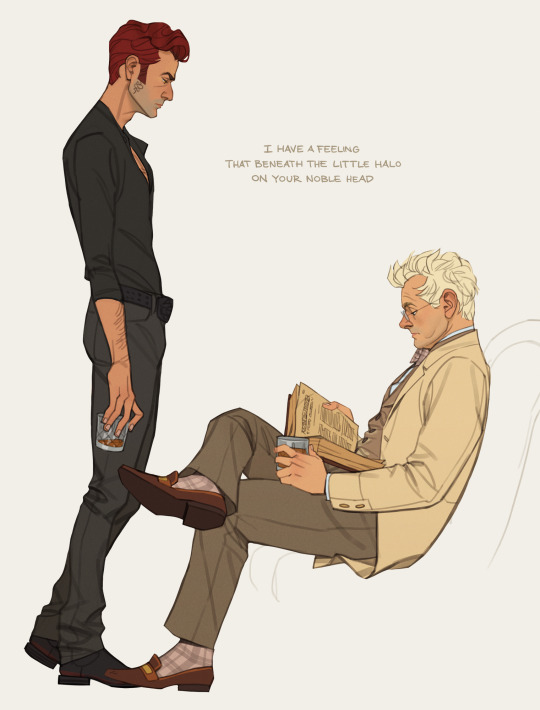
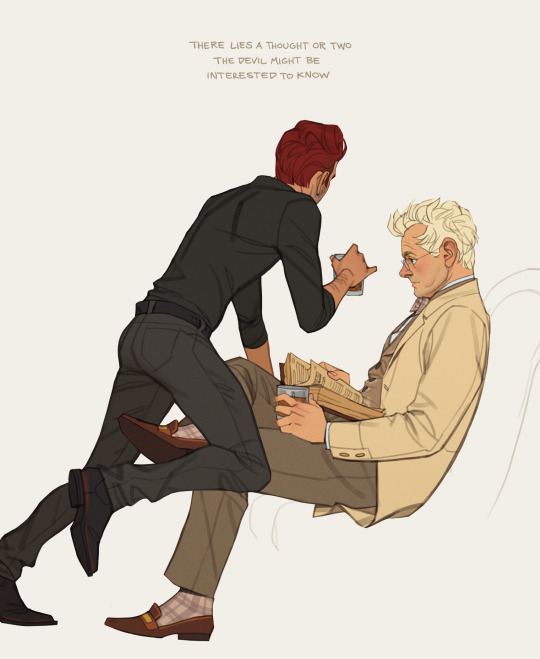
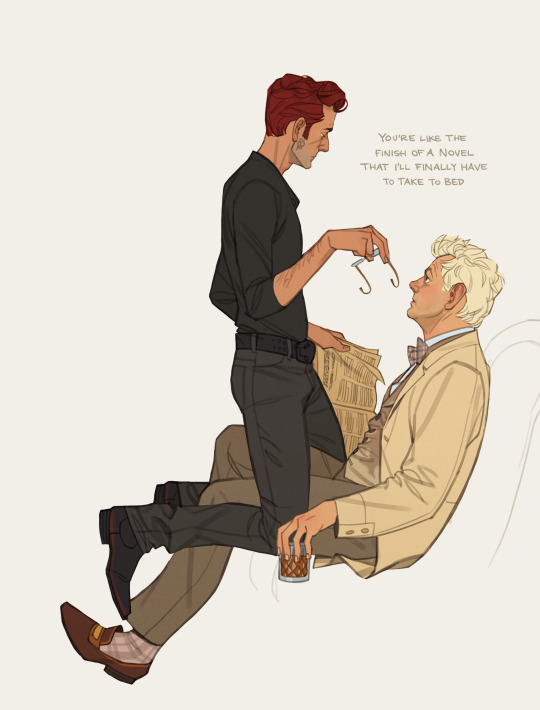


I have a feeling that beneath the little halo on your noble head There lies a thought or two the devil might be interested to know You're like the finish of a novel that I'll finally have to take to bed You fascinate me so
You Fascinate Me So, Blossom Dearie
91K notes
·
View notes
Text

#I don’t know how to feel about this#on one hand#it’s pretty cool looking#on the other#what the fuck this is so disrespectful
20K notes
·
View notes
Text
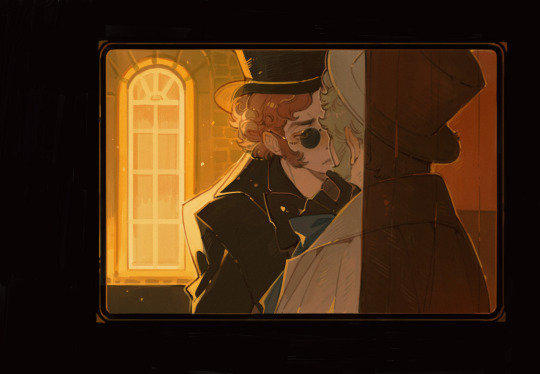
3K notes
·
View notes
Text

support your local businesses!!!
13K notes
·
View notes
Text
Back on the bench
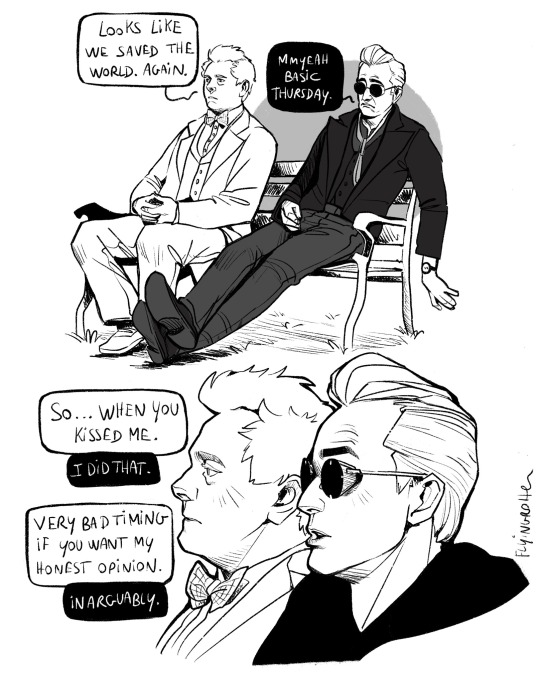
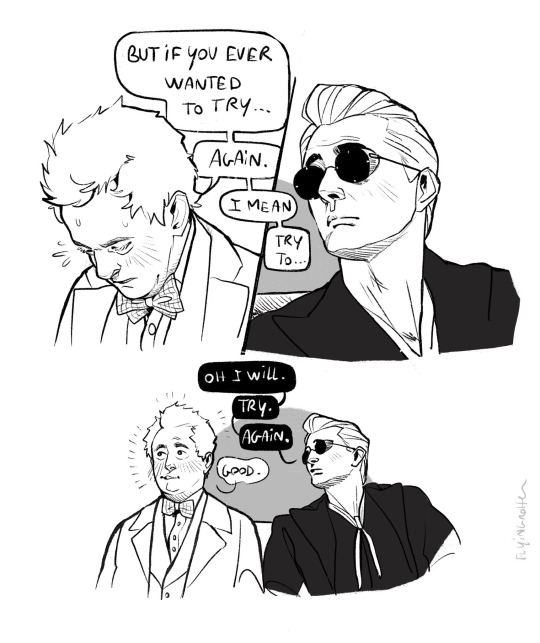
And again, and again…

#this dialogue is spot on#I can actually hear their voices#intonation and pacing and everything#now that is some good dialogue#hot damn
78K notes
·
View notes
Text
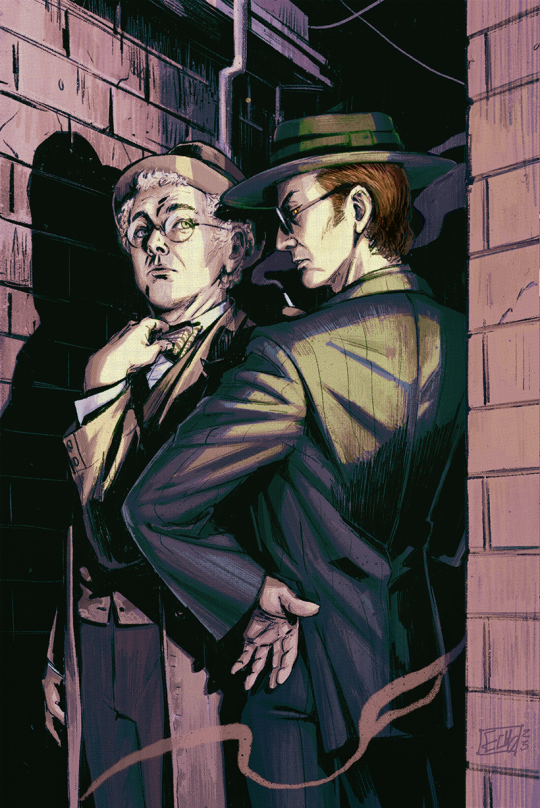
Keep walking
#good omens#probably going to become a GO fan blog because art like this is too good not to reblog#amazing#what are they doing back there#and why am I approaching#why does Crowley know and Aziraphale hasn’t seemed to notice me#is it because my intentions are nefarious#also#I love art that implicates the viewer in the narrative#*chef’s kiss*
7K notes
·
View notes
Text

Surprise me, mr. British Magician
2K notes
·
View notes
Note
Neil Gaiman and the Audacity of This Bitch
Hi, Neil
Just quick reminder, in case you've forgotten: TV shows are supposed to save us from hurtful reality, and S2 had a genre hurt/no comfort.
I really hope S3, if it ever happens (or a book maybe?), will take away all no-s, and transform them into yes-s. I refuse to embrace cruel reality of the end of Ep6. I even wrote a fix-it on Ao3.
Your heartbroken, saddened, crying 😭 fan,
Lots of love and respect though, always,
Helen
I'm sorry. I thought that anyone who had seen Crowley and Aziraphale split up in the Bandstand and again on the Soho street, and the bookshop burn down and Aziraphale discorporate, in Season 1, had already experienced bad things happening to characters they love, especially at the end of act 2.
And no, I didn't ever think that I was only making comfort viewing. I was making thinking and feeling viewing too.
I love that it's making people write fix-it-fictions. That's always the best response to art: making your own.
#seriously who are these people#like what in the fresh hell#Mr. Gaiman please don’t leave us#I appreciate you so much
10K notes
·
View notes
Text
Fatigue is among the most common and most disabling of long COVID’s symptoms, and a signature of similar chronic illnesses such as myalgic encephalomyelitis (also known as chronic fatigue syndrome or ME/CFS). But in these diseases, fatigue is so distinct from everyday weariness that most of the people I have talked with were unprepared for how severe, multifaceted, and persistent it can be.
For a start, this fatigue isn’t really a single symptom; it has many faces. It can weigh the body down: Lisa Geiszler likens it to “wearing a lead exoskeleton on a planet with extremely high gravity, while being riddled with severe arthritis.” It can rev the body up: Many fatigued people feel “wired and tired,” paradoxically in fight-or-flight mode despite being utterly depleted. It can be cognitive: Thoughts become sluggish, incoherent, and sometimes painful—like “there’s steel wool stuck in my frontal lobe,” Gwynn Dujardin, a literary historian with ME, told me.
Fatigue turns the most mundane of tasks into an “agonizing cost-benefit analysis,” Misko said. If you do laundry, how long will you need to rest to later make a meal? If you drink water, will you be able to reach the toilet? Only a quarter of long-haulers have symptoms that severely limit their daily activities, but even those with “moderate” cases are profoundly limited. Julia Moore Vogel, a program director at Scripps Research, still works, but washing her hair, she told me, leaves her as exhausted as the long-distance runs she used to do.
And though normal fatigue is temporary and amenable to agency—even after a marathon, you can will yourself into a shower, and you’ll feel better after sleeping—rest often fails to cure the fatigue of long COVID or ME/CFS. “I wake up fatigued,” Letícia Soares, who has long COVID, told me.
Between long COVID, ME/CFS, and other energy-limiting chronic illnesses, millions of people in the U.S. alone experience debilitating fatigue. But American society tends to equate inactivity with immorality, and productivity with worth. Faced with a condition that simply doesn’t allow people to move—even one whose deficits can be measured and explained—many doctors and loved ones default to disbelief. When Soares tells others about her illness, they usually say, “Oh yeah, I’m tired too.” When she was bedbound for days, people told her, “I need a weekend like that.” Soares’s problems are very real, and although researchers have started to figure out why so many people like her are suffering, they don’t yet know how to stop it.
…
Post-exertional malaise, or PEM, is the defining trait of ME/CFS and a common feature of long COVID. It is often portrayed as an extreme form of fatigue, but it is more correctly understood as a physiological state in which all existing symptoms burn more fiercely and new ones ignite. Beyond fatigue, people who get PEM might also feel intense radiant pain, an inflammatory burning feeling, or gastrointestinal and cognitive problems: “You feel poisoned, flu-ish, concussed,” Misko said. And where fatigue usually sets in right after exertion, PEM might strike hours or days later, and with disproportionate ferocity. Even gentle physical or mental effort might lay people out for days, weeks, months. Visiting a doctor can precipitate a crash, and so can filling out applications for disability benefits—or sensing bright lights and loud sounds, regulating body temperature on hot days, or coping with stress. And if in fatigue your batteries feel drained, in PEM they’re missing entirely. It’s the annihilation of possibility: Most people experience the desperation of being unable to move only in nightmares, Dujardin told me. “PEM is like that, but much more painful.”
Medical professionals generally don’t learn about PEM during their training. Many people doubt its existence because it is so unlike anything that healthy people endure. Mary Dimmock told me that she understood what it meant only when she saw her son, Matthew, who has ME/CFS, crash in front of her eyes. “He just melted,” Dimmock said. But most people never see such damage because PEM hides those in the midst of it from public view. And because it usually occurs after a delay, people who experience PEM might appear well to friends and colleagues who then don’t witness the exorbitant price they later pay.
…
Oller thinks this dismissal arises because PEM inverts the dogma that exercise is good for you—an adage that, for most other illnesses, is correct. “It’s not easy to change what you’ve been doing your whole career, even when I tell someone that they might be harming their patients,” she said. Indeed, many long-haulers get worse because they don’t get enough rest in their first weeks of illness, or try to exercise through their symptoms on doctors’ orders.
People with PEM are also frequently misdiagnosed. They’re told that they’re deconditioned from being too sedentary, when their inactivity is the result of frequent crashes, not the cause. They’re told that they’re depressed and unmotivated, when they are usually desperate to move and either physically incapable of doing so or using restraint to avoid crashing. Oller is part of a support group of 1,500 endurance athletes with long COVID who are well used to running, swimming, and biking through pain and tiredness. “Why would we all just stop?” she asked.
Some patients with energy-limiting illnesses argue that the names of their diseases and symptoms make them easier to discredit. Fatigue invites people to minimize severe depletion as everyday tiredness. Chronic fatigue syndrome collapses a wide-ranging disabling condition into a single symptom that is easy to trivialize. These complaints are valid, but the problem runs deeper than any name.
Dujardin, the English professor who is (very slowly) writing a cultural history of fatigue, thinks that our concept of it has been impoverished by centuries of reductionism. As the study of medicine slowly fractured into anatomical specialties, it lost an overarching sense of the systems that contribute to human energy, or its absence. The concept of energy was (and still is) central to animistic philosophies, and though once core to the Western world, too, it is now culturally associated with quackery and pseudoscience. “There are vials of ‘energy boosters’ by every cash register in the U.S.,” Dujardin said, but when the NIH convened a conference on the biology of fatigue in 2021, “specialists kept observing that no standard definition exists for fatigue, and everyone was working from different ideas of human energy.” These terms have become so unhelpfully unspecific that our concept of “fatigue” can encompass a wide array of states including PEM and idleness, and can be heavily influenced by social forces—in particular the desire to exploit the energy of others.
As the historian Emily K. Abel notes in Sick and Tired: An Intimate History of Fatigue, many studies of everyday fatigue at the turn of the 20th century focused on the weariness of manual laborers, and were done to find ways to make those workers more productive. During this period, fatigue was recast from a physiological limit that employers must work around into a psychological failure that individuals must work against. “Present-day society stigmatizes those who don’t Push through; keep at it; show grit,” Dujardin said, and for the sin of subverting those norms, long-haulers “are not just disbelieved but treated openly with contempt.” Fatigue is “profoundly anti-capitalistic,” Jaime Seltzer, the director of scientific and medical outreach at the advocacy group MEAction, told me.
Energy-limiting illnesses also disproportionately affect women, who have long been portrayed as prone to idleness. Dujardin notes that in Western epics, women such as Circe and Dido were perceived harshly for averting questing heroes such as Odysseus and Aeneas with the temptation of rest. Later, the onset of industrialization turned women instead into emblems of homebound idleness while men labored in public. As shirking work became a moral failure, it also remained a feminine one.
…
Some COVID long-haulers do recover. But several studies have found that, so far, most don’t fully return to their previous baseline, and many who become severely ill stay that way. This pool of persistently sick people is now mired in the same neglect that has long plagued those who suffer from illnesses such as ME/CFS. Research into such conditions are grossly underfunded, so no cures exist. Very few doctors in the U.S. know how to treat these conditions, and many are nearing retirement, so patients struggle to find care. Long-COVID clinics exist but vary in quality: Some know nothing about other energy-limiting illnesses, and still prescribe potentially harmful and officially discouraged treatments such as exercise. Clinicians who better understand these illnesses know that caution is crucial. When Putrino works with long-haulers to recondition their autonomic nervous system, he always starts as gently as possible to avoid triggering PEM. Such work “isn’t easy and isn’t fast,” he said, and it usually means stabilizing people instead of curing them.
---
Ed Yong's follow up to his previous piece on post-COVID brain fog published last year:
#unpopular opinion#I had debilitating CFS#disability paperwork done and everything#and I fixed myself with exercise#it was brutal#devastating#had to move somewhere that I was essentially taken care of because I couldn’t take care of myself#and exercise at the same time#it took almost a year#of gradually increasing my running time#until I could run a half marathon (slowly)#but I did it#I fixed myself#and it was worth almost dying for
6K notes
·
View notes
Text
I don't think that Aziraphale fell in love with Crowley during The Blitz. I think Aziraphale *realized for sure that he was capable of romantic love* during The Blitz... because Crowley had shown that he was. These are two different things...
This is a bit long... Controversial opinions below...

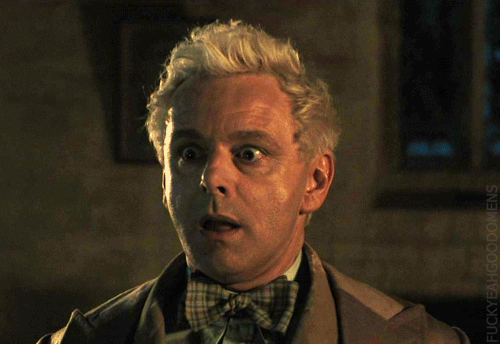
Aziraphale has always had a thing for Crowley, since the beginning or damn near it. We see evidence of liking his attention and enjoying talking with him in the Garden. We see joy at seeing Crowley and nervousness about getting his attention ("still a demon then?") in Ancient Rome. We see him absolutely *loving* having Crowley wrapped around his finger at the Globe Theatre and we see naked lust and damsel fantasies when he's checking him out in The Bastille. Having feelings for Crowley is not something that just suddenly happened during The Blitz, imo... they are fundamental to who Aziraphale has always been... but Aziraphale does not think himself a very good angel.
To Aziraphale, an angel is a being of love so why *wouldn't* he love Crowley? He loves *everyone*-- fallen or not, human or animal or etheral or supernatural. His *entire identity and only job* is built around love and spreading it. At some point, he began to realize that what he felt for Crowley was different than what he felt for others and, as his study of humanity progressed, he would note the things it seemed to be like. Aziraphale loves humanity to absolute bits and that includes all the fun things they've uncovered to get up to, from books to super gay gentleman's clubs to Parisian crepes. Aziraphale absolutely noticed that he's attracted to Crowley. He absolutely knew that the things he felt about Crowley were things that these humans were writing about in love songs, except that *it couldn't be, not really, because that would be wrong* because he's *not* a human.
He's an *angel*.
And Crowley is a fallen angel-- a *demon*.
They are beings who cannot feel these things of humans, not fully. Is this denial on Aziraphale's part? Oh, heavens, yes. Because what kind of angel would he be if, instead of just spreading love everywhere, he actually went and *fell* in love with, of all creatures, a *demon*? What kind of angel wants to roger said demon into next Tuesday? The same kind of angel who likes to indulge in pleasures in a way that is definitely not de rigueur in sanitized, open floor plan Heaven. Does *Crowley* care that Aziraphale eats too many sweets and loves the pleasures of a good book? Of course not but Crowley is a demon so he should be into indulgence. Aziraphale doesn't expect Crowley to understand that the things they share in common-- the love of music (if different types), of the stars, of words (books, plays), of food (Aziraphale eating it, Crowley watching Aziraphale eating it) and really just *humanity* as a whole--... these things make Crowley a perfectly fine demon but Aziraphale a very, very bad angel. While Crowley rather likes that Aziraphale is different from other angels, *Aziraphale* doesn't like that about himself all the time. This is why it takes until The Blitz for Aziraphale to let himself admit that the romantic love he feels for Crowley is, in fact, romantic love... he can't admit it until Crowley, through Crowley's own actions, shows him.
It happens during The Blitz because *Crowley* shows him that *demons* are capable of romantic love. Not only capable of it but really rather quite *good* at it, if they are of such a mind. Crowley's act of saving the books is what does it. Aziraphale knows that Crowley will always come to rescue him. The Bastille proves it. He not only knows it but he goes out of his way to set up scenarios for Crowley to come to his rescue. What sets The Blitz apart is Crowley saving Aziraphale's books. It is an act of such pure, unselfish, unconditional love that Aziraphale cannot see it as anything *but* that. Crowley has been bringing Aziraphale presents for millennia. He's rescued him more times than either of them can count. They've spent centuries in one another's company and performed literal miracles to make one another happy and safe and comfortable but the reason why it's the books during The Blitz that changes everything for Aziraphale is because everything else, if Aziraphale was of mine to, could be spun as Crowley being a demon and trying to keep Aziraphale close for his *own* reasons.
Aziraphale isn't really an idiot. He knows the wily ol' serpent feels the same way about him as he does about them. It's been centuries upon centuries. He's noticed Crowley's love and adoration and desperate, pining want-- he's just never *allowed himself to assume that these things aren't just demon-y traits*. He thinks Crowley *is just like this* lol. That everyone gets this version of Crowley. And since they barely interact with one another in front of other people lest they get caught fraternizing, there's not really anyone to ever argue against this point.
Ever notice how Aziraphale thinks Crowley is the smoothest, slickest tempter known to man? He's *Asmodeus* to Aziraphale. He's a seductive snake who lured all of humanity out of the garden. Aziraphale thinks himself just an angel (the one who failed at guarding said garden, mind you) and not an especially good one at that. Crowley is *tempting*... because he's temptation personified. (Demonified?) Aziraphale thinks he is *tempted* by Crowley because he is weak and a bad angel. To Aziraphale, Crowley isn't *capable* of things like romantic love because Aziraphale has been taught that all angels are just beings of pure love of God-- a kind of non-sexual, generalized love for all of God's creatures-- and Crowley is a fallen angel. Not only was he not capable of romantic love when he was an angel but he certainly couldn't be now that he's a *demon*, right?
But then Crowley saves the books. Oh, the books...

And the only reason he would is for Aziraphale. The books are old but there are other copies. It's not all the world's knowledge; it's just Aziraphale's favorites from his prophecy collection. Just his own, very human, very earthly, possessions, rescued from a fire by the romantic hero who has also come to rescue him. Just a little miracle of Crowley's own-- using his powers and risking the wrath of Hell to comfort Aziraphale and make him happy.
It's obviously not the first time Crowley has done so but it's the first time that Aziraphale has had *no other excuse* in his mind for why Crowley did what he did for Aziraphale. The Arrangement? Benefitted Crowley. Spending time with Aziraphale? Benefitted Crowley by keeping Aziraphale invested in The Arrangement. Flirting with him, bringing him little gifts? The Arrangement, The Arrangement, The Arrangement... But the books?
Crowley didn't have to do that. He had come to rescue him. The dashing hero kink was already fufilled for Aziraphale. But saving Aziraphale's beloved books and the soft "little miracle of my own" and "lift home" and Aziraphale realized that, Demonic Chief Seductress of Hell or not, Crowley was in love with him.
Not just fond of him. Not just flirting with him or bemused by Aziraphale's lust and indulging him. Not just friends, even.
In love with him.
Demons could fall in love.
And if demons could be in love, then angels...
The Blitz is also *way* different from the era circa The Bastille, when Aziraphale decided that maybe millennia of being flirted with by Asmoseus himself was too much for any one angel to withstand without actively indulging in a bit-- and their long history and everything up to that point confirming that Crowley was soft for him (FOR HIM, a terrible, little, nobody angel!) made him feel safe enough to play a bit more of a heavier hand... even if that, too, was a bit terrifying. When Crowley asked Aziraphale to lunch in the modern era in S1, telling him they could go anywhere Aziraphale wanted to go (a call back, we would learn, to the Soho car "I'll take you anywhere you want to go" scene), what does Aziraphale say?
He doesn't say London in the '40s. (Admittedly, who would want to be there then, romance with Crowley notwithstanding?) Nor any other time. He says:
"Paris. 1793." to which Crowley replies with a little knowing smile:
"Ah. The Reign of Terror."
Yeah, Crowley's not *just* referring to the actual, historical Reign of Terror here. He's referring to *Aziraphale's* reign of terror. *Their* reign of terror. Aziraphale's whole lusty arc, from crepes to "learning The Gavotte" here as he upped the ante on their relationship for the first time...
"Was that one yours or mine?" Crowley asks, putting Aziraphale a bit at ease after knowing that admitting to Paris 1793 was a bit of open honesty by telling him that Aziraphale wasn't the only one scared out of his mind then. (Was that bit of our history primarily my terror or your terror? is what Crowley's really asking. Which one of us was fucking it up then, do you remember?... Not that they don't remember. They both do. Crowley is trying to say that the fear isn't one-sided-- that Aziraphale isn't the only one for whom all of this has always been terrifying.)
Aziraphale says he can't remember (might not be true) but that it doesn't matter because "the crepes were lovely" and Crowley smiles.
Because Aziraphale is calling him lovely. Says their date was lovely and he was lovely. Crowley all like...
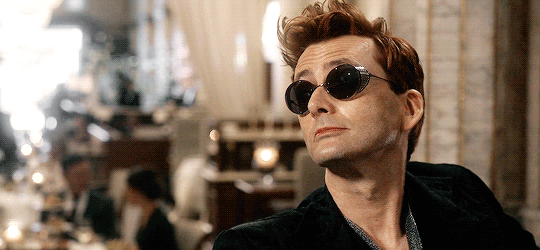
The reason why Aziraphale wants to go back to lunch on the post-Bastille date is not just the crepes (though they were really good but you cannot tell me that the French haven't gotten better at making them since the 1700s lol. I'm sure there's a better creperie he and Crowley could have lunched at in the modern era.) He wants to go back there because, in a way, as complicated as it felt, it was *simpler* because Aziraphale thought he understood what he and Crowley were then.

He thought Crowley was temptation personified and that he, Aziraphale, had finally gone full Eve and wanted to give in. He thought it was lust. A little bit of rescue kink. Eyes raking him over. the fun, daring game of playing at the seduction *of temptation itself*. The power of knowing that Hell's Seductress in Chief was weak *for him*. That's a sexy lunch. Those are some *damn good crepes* lol.
Finally, Aziraphale had it figured out, right? He was a being of love since he was an angel so he loved all beings and that included Crowley but not in the way the humans sing and write about, no, cannot be, because he's an angel... but... angels-- bad ones, like himself-- did appear to be open to temptation and Aziraphale has been on Earth since the beginning and struggles to define the difference between temptation and pleasure. Is moaning over this blueberry muffin sinful-- or is it marveling at the work of God's creatures? How could his favorite symphony not be of God? How could God have created sexual attraction between the humans and not made it holy? Still... none of that meant that having these human-like feelings *as an angel* made them okay. Angels were supposed to think like Gabriel. They weren't supposed to want to sully the celestial temple of their corporations with gross matter-- in any way, shape or form. So what did it say about Aziraphale *to* Aziraphale if he liked art and food and if he got all sorts of hot about how Crowley looked at him?

And then not that long after that (not that long for them) came the 1800s and Crowley wanting holy water, right? Aziraphale defaulted to the idea that Crowley's motivations *had* to be selfish on Crowley's part. He was a demon so they *had* to be. It couldn't be about protecting the two of them. Holy water could kill Crowley-- it could kill other demons. Crowley's request was a subtle suggestion that *he might be willing to kill other demons to protect Aziraphale, an angel* and that went against *everything* Aziraphale knew to be true and he completely panicked. He made it entirely about Crowley's own, occasional, suicidal ideations (which do exist) and ignored the other potential reasons because it was too much for him to admit that Crowley's hurt-- his loneliness, his terror-- might be because Aziraphale had gotten this all very, very wrong. He might have just spent the last few decades leading Crowley on, thinking that the fraterization was what the demon would want, not thinking that anything more was possible. Because it *couldn't* be possible for Crowley to feel those things *because then Aziraphale would be capable of them, too*. So long as Aziraphale pretends that Crowley the Fallen Angel is incapable of more than mischief and self-serving arrangements and demonic lust, then Aziraphale can remain comforted in his feelings that he isn't capable of feeling not *angelic, generalized* love but *romantic, very much unplatonic* love for *his hereditary enemy*. A *human* would have been easier for Aziraphale to understand and maybe even solicit more sympathy should anyone find out but *Crowley*?
It would mean he wasn't just a bad angel, by Heaven's standards.
It would mean he doesn't know what an angel *truly is*.
When Crowley shows Aziraphale during The Blitz that he loves him-- that he's *in* love with him-- that every longing look was just that, that every spark of desperate lust in his yellow eyes was just that, that demons are fallen angels and angels can feel these human things and that that's what they are feeling-- these human things-- Aziraphale doesn't fall in love.
He was already in love.
He allows himself, for the first moment in their history, to *be* in love with Crowley, even if it's existed the whole time.
But...

By Soho in the '60s, he and Crowley both know. They know the other knows how they feel. Crowley, back in the '40s, thought Aziraphale was more ready than he was after the whole Reign of Terror through the Holy Water Incident. He thought he just had to show Aziraphale that how he felt was pure and true and he did do that. It's just that it completely upended everything Aziraphale thought he knew about himself and his place in the universe and challenged everything he had ever known or been taught. He needed time to work through that. He asked Crowley for time. He brought him the holy water-- in that cute little tartan Thermos-- to say he understood.
You're mine, see, and I'm yours. I'm just not ready for this. And I'm not sure if I ever *should* be ready for it... is the general attitude he conveys.
He didn't give up on the idea of him and Crowley and that is really beautiful when you consider that the no-longer-deniable truth of it basically was killing Aziraphale, as it made him feel like he failed at the only thing he was ever supposed to be, which means he failed at his whole purpose in life.
Maybe one day we could go for a picnic... or dine at the Ritz.
It's still a pipe dream for Aziraphale in the '60s. These are very romantic things he wants to do with Crowley. These are dates they could go on. This isn't just lust and it's not just friendship anymore. He knows Crowley's in love with him. Aziraphale has never denied having feelings of his own in return but he might never have said them more directly than with his little tartan Thermos and his daydream date ideas. The general vibe is I wish we could have this but I don't really see how and you wanting to just try it scares me. What if I fall? What if it turns out that everything I know isn't true?
It already was untrue and Aziraphale knew it. In a way, in the future, he'd tell Crowley he wanted to go back to 1793 Paris for that crepe date and start it all over again. They had 11 years-- nothing, to them-- until the end of the world. He's telling Crowley they shouldn't work together to stop it-- It's ineffable! It's God's plan! I've already interfered enough being an angel who is hopelessly lusting after and madly in love with bloody Asmodeus! If you think I'm stopping Armageddon so I can keep drinking wine and hanging out in my bookstore with you, you're mad!...
...but he's also saying to Crowley at the same time...
...I now know we are almost out of time and I regret thinking I would have countless more millennia with you to work this out. I wish we could go back and try again. I wish I had known what it was like to be with you before it was all over.
To which Crowley responds by taking him to the damn Ritz lol. (Twice, by S1's end.)
As if he's saying: can't time travel to 1793, Angel, but we can definintely make the most of every moment left.
After which... Aziraphale invites him back for Chateauneuf-de-Pape, in a situation we think might connect to S2's post-Blitz scene, based on the trailer. Just as Aziraphale is saying to Crowley that he wishes he had done things differently and Crowley gives him the opportunity to do things differently going forward by dining with him at the Ritz, it goes back to the Blitz as they walk to the bookstore, because it always will...
...because that is the first moment Aziraphale admitted he was in love because it was the first moment he truly knew that Crowley was in love with him and that the things they both felt are, in fact, romantic love.

259 notes
·
View notes
Video
Ya know how in Watchmen, Dr. Manhattan exists in all times at the same time? That’s what watching this felt like. I am both in 2020 and 2005. Who is this intrepid time traveler???
160K notes
·
View notes
